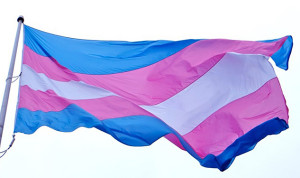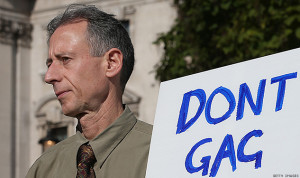When our oldest daughter was 2 years old and in day care, she had a habit of taste-testing everything. Thankfully, nothing in the day care room was toxic, but we found ourselves dispensing oddly specific advice in the morning like, “Please don’t eat the green Play-doh today.”
Similarly with supposed transgender allies, their most spectacular and maddening failures could be averted with advice that should fall well within the realm of common sense. Don’t support reparative therapy, support transgender rights, don’t take sides with people who want transgender people off their planet. That sort of thing.
Without further ado, here are six easy ways allies can avoid failing spectacularly.
1. Don’t support reparative therapy on transgender children.
One thing that has consistently astounded me is when supposed allies who are fierce opponents of sexual orientation change efforts on lesbian and gay children support the same techniquesbeing used on transgender youth. Their rationale is that reparative therapy on transgender youth is OK because not all the evidence is in yet. Which is ironic, given many of these individuals are gay, married, and have conservatives saying their marriages should be nullified because “evidence on parenting by same-sex couples is inadequate” — a claim that is not true.
Here’s a hint: If something is barbaric and torturous when used on gay kids, it’s probably not good for transgender kids either.
2. Make at least one transgender-specific issue a priority.
There are a lot of problems LGBT organizations could avoid if they would just pick one transgender-specific issue (like state ID card regulations) and make a good faith effort to improve the situation. However, if you’re running an LGBT organization and you tell your transgender members that you don’t have the time, money, resources, or inclination to work on any issues important to transgender people — something I’ve heard before at numerous meetings and gatherings — you’re an LGB organization. In one swift motion, you have asked the people expected to “sell” your organization to other transgender people to tokenize themselves. Ironically, these same organizations often wonder why transgender people aren’t willing to stand up with them later on LGBT-related legislation or even blame transgender people for not participating in the process. Why would we, after you tokenized your transgender leaders and won’t work on things important to us?
3. Have a basic level of competence on transgender culture.
So let’s just say transgender people do show up to support issues that are more LGB than T. That will show we’re team players, right? Not necessarily.
Remember, it only took one culturally inept and overzealous staffer who didn’t recognize the transgender pride flag at the Supreme Court oral arguments in 2013 to undo years of Human Rights Campaign bridge-building to transgender people. And despite people like Paula Neira and Autumn Sandeen (two transgender women) being key players in the fight to end “don’t ask, don’t tell,” finding funding to fight the ban on transgender troops is a difficult endeavor.
Combine incidents like these with refusing to work on transgender-specific issues, and it sends a message guaranteed to keep us at home: “You can come out and support us all you like, but we will never get you, and there will not be a quid pro quo.”
That isn’t what organizations are trying to say, but it is what we hear.
4. Don’t side with extremists.
When British activist Peter Tatchell signed a letter in favor of giving platforms to people advocating for the cultural genocide of transgender people, he was somehow surprised that transgender people were miffed. He became defensive and beat his chest about being a great ally, stating, “I have a 40-year record of supporting trans people and rights, starting in the early 1970s when many people did not. I am now told that my support for the trans community is not wanted.”
Speaking as a transgender person, no, we do not need your kind of help. You supported people whose mission is to “morally mandate it [transgender people] out of existence,” and proudly state, “They expect we’ll be shocked to see statistics about them being killed, and don’t realize, some of us wish they would all be dead.” Meanwhile, transgender women of color are dying at a record rate, and state after state is trying to legislate transgender people out of existence.
You’ll therefore have to excuse my skepticism of your credentials as an ally, since you seem to value their imaginary right to a platform urging cultural genocide more than our right to resist said genocide.
5. Don’t appear to side with transphobic people.
Sometimes, even great allies make horrible mistakes. Such is the case with the National Center for Lesbian Rights and the National LGBTQ Task Force. Both have been some of the most stalwart defenders of transgender people over the past decade. When both of these organizations pulled out of the boycott of the Michigan Womyn’s Music Festival — which is ending its 40-year run this year —it inadvertently sent a devastating message to transgender people: “We value the money of those who hate transgender people more than we value the support of transgender people.”
This isn’t what they intended to do. I know they genuinely believed backing out of the boycott would facilitate the negotiation process with MichFest. However, they gave a giant concession and gained nothing tangible in return; kind of like Neville Chamberlain, but without even the piece of paper to wave around. In the process, these otherwise excellent organizations lost a lot of trust from the transgender community, even among those who otherwise have supported them.
If they couldn’t (easily) predict how this would be seen, what else don’t they get about transgender people?
6. Don’t call transgender people perverts and self-hating homosexuals.
It would seem like a total no-brainer, but if you want to be considered a transgender ally, you probably shouldn’t write a book about transgender people that includes a full chapter devoted to why we’re all a bunch of icky weirdos whose identities are a delusion. Funny part is, the author and many other proponents of this theory can’t quite seem to get why on earth transgender people get all huffy when you call them perverts and tell them their identities are a fraud. Or that these are the sorts of stereotypes that contribute to us being routinely fired, denied housing, denied medical care, or just outright killed.
What would you expect to happen if you wrote a book about a racial minority, regurgitated the most hateful stereotypes imaginable in it as fact, and then asked them to accept your assertion you’re a true friend to their community? Realistically, you’d expect the people you just insulted to be angry, and not to believe your assertions. In fact, they’d see such claims of alliance as chutzpah.
In short, you don’t get to call me a pervert and a man, then believe I’m supposed to consider you a friend and ally. It just doesn’t work that way; not just for transgender people, but for everyone.
The SCOTUS Event Horizon for the LGBT Movement

Stop for a moment. Imagine how bad it will be…






